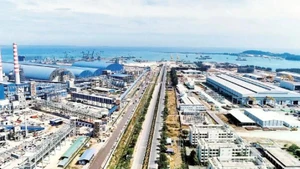The private economy is the main driving force of Viet Nam’s economic dynamism, contributing more than 40% of GDP and providing jobs for the majority of the workforce. However, inefficiencies in institutions, regulatory instability, and weak property rights continue to limit the sector’s effectiveness.
Resolution No. 68-NQ/TW points out that the private economy still faces numerous barriers hindering its development. It has not made a breakthrough in scale and competitiveness, failing to meet the requirements and expectations of being a key force of the national economy.
At the ministerial-level dialogue of the Viet Nam Private Economic Forum 2025, held by the Viet Nam Young Entrepreneurs Association in mid-September, many delegates highlighted related obstacles and proposed breakthrough solutions to help private enterprises thrive, thereby contributing to the successful implementation of not only Resolution No. 68 but also Resolution No. 66 on renovating the process of law-making and law enforcement.
According to Nguyen Hong Phong, Vice Chairman of the Viet Nam Young Entrepreneurs Association and Vice Chairman of the Viet Nam Association of Science and Technology Enterprises, the current legal framework has many shortcomings, leaving innovation-related fields in a “legal vacuum”.
For instance, some new technologies are slow to be updated in registration and commercialisation lists. As a result, many young and start-up businesses producing agricultural bioproducts have had to take a “detour”, registering their products as “new fertilisers”, forcing them to spend many years retesting.
In 2005, the Law on E-Transactions was introduced, but many of its guiding documents were outdated upon issuance, particularly as new concepts such as cross-border e-commerce, fintech, and blockchain quickly emerged. It was not until 2023 that the revised Law on E-Transactions was finally passed by the National Assembly.
Of the three factors – institutions, infrastructure, and human resources – General Secretary To Lam has pointed out that current institutions remain the “bottleneck of bottlenecks”. For commercial transactions, good institutions will improve economic efficiency, reduce transaction and production costs.
However, according to Dau Anh Tuan, Head of VCCI’s Legal Department, a real estate project is currently affected by nine different laws and dozens of guiding circulars, not to mention a series of other procedures that are inconsistent or even overlapping.
Statistics from the Viet Nam Chamber of Commerce and Industry (VCCI) show that in 2023, only about 20% of enterprises’ recommendations were responded to during the law-making process, compared to 60% in Organisation for Economic Co-operation and Development (OECD) countries.
Dr. Le Truong Son, Rector of Ho Chi Minh City University of Law, said that to remove barriers hindering the development of the private sector and to create conditions for young entrepreneurs to promote their potential and creativity, the law must be stable, transparent, consistent, and effective, while the legal system must soon be improved to enhance economic efficiency.
According to other experts, these solutions must focus on supporting young entrepreneurs in international integration; perfecting institutions for the green and circular economy; investing in strategic infrastructure and logistics; and strengthening regular dialogue between ministries, sectors, and young start-up entrepreneurs.
In the context of an increasingly global appearance of new philosophies, production methods, digital assets, and modern intellectual products, lack of specificity in policies and legal gaps must be quickly filled.
This will help build a creative institution where private enterprises, especially young businesses, can confidently develop, becoming a powerful driving force for sustainable national development, in line with the principle that “Law must accompany and pave the way for life.”
















